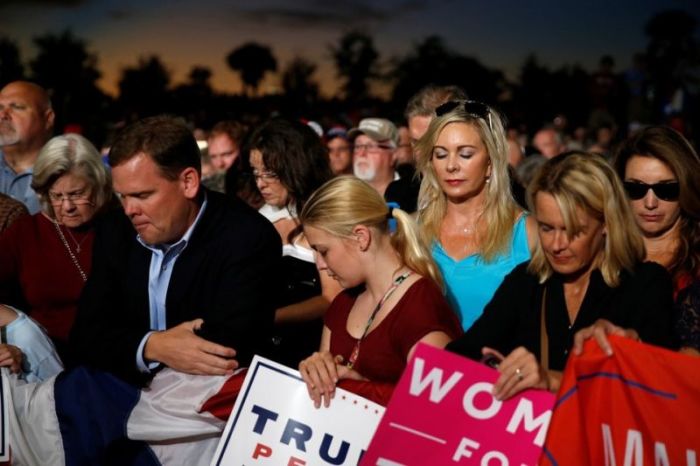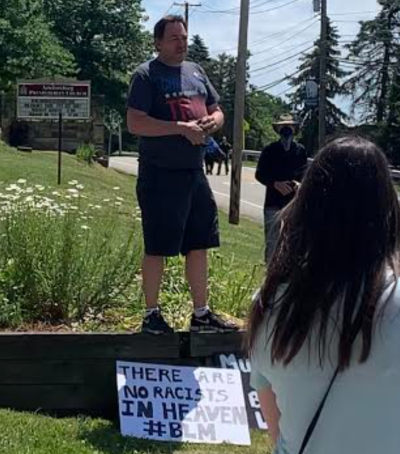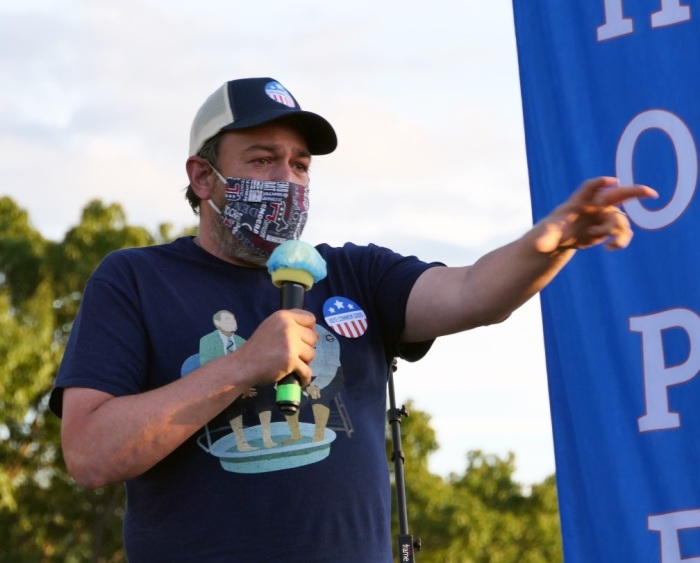Did white evangelical support for Trump drop in the 2020 election?

Bill Werts grew up in rural north central Pennsylvania and always identified as an evangelical conservative. He listened to conservative radio talk shows, emulated Christian conservative politicians like Mike Pence and even participated in the March for Life in Washington, D.C. five times.
After supporting staunch conservative Texas Sen. Ted Cruz in the 2016 Republican primary, the 46-year-old held reservations about voting for President Donald Trump in that year’s general election considering his background, past indiscretions and what he considered to be a “racist” base the thrice-married real estate mogul tried to win over.

But after hearing prominent conservative leaders voice their support for Trump over then-Democratic nominee Hillary Clinton and seeing Trump pick Pence to be his running mate, Werts reluctantly bought in.
“When Trump won the nomination, I obviously had my questions and I was determined not to vote for him. Then he nominated Mike Pence as his running mate. I thought, maybe just possibly, I am the one that is wrong,” Werts, a manufacturing supervisor, told The Christian Post in a phone interview.
“Franklin Graham is telling me I am wrong. [Pat] Robertson is telling me that I am wrong. Jerry Fallwell is telling me that I am wrong. Maybe I am the one that is wrong. With all reservations, I ended up voting for Trump.”
But four years later, Werts is not the same person politically. While witnessing the early days of the Trump presidency, Werts’ political views began to shift to the left. He switched parties in 2018. In 2020, he cast his vote for former Vice President Joe Biden as the Democrat picked up the key battleground state by less than 100,000 votes on his way to an eventual election victory.
Network exit polls seem to suggest that Werts may have been part of a small percentage of white evangelicals who voted for Trump in 2016 but did not vote for him in 2020.
Werts said he believes many evangelical conservatives who also did not vote for Trump this time around may have voted for other Republicans in down-ballot races. But he assured that he voted Democratic in the majority of the races on his ballot.
The straw that “broke the camel’s back” for him was media coverage of how migrant children were being detained in cages (built during the Obama administration) at the southern border, which also drew responses from evangelical leaders at the time and much uproar from the left.
“But I still had my conservative leanings and still had my conservative roots and I also felt I couldn’t support Democrats,” he explained. “I guess you could say I was looking for reasons to support Democrats for the past two years. The hardest bridge for me to cross was on abortion.“
In 2018, Werts participated in a protest at a local courthouse over the Trump administration’s immigration policies, where he was connected with the progressive organization in his county called Voices of Westmoreland.

From there, he was influenced by more progressive thoughts and reading materials. Eventually, he spoke at a progressive Christian rally in Pittsburgh organized by the evangelical left grassroots organization Vote Common Good, which held dozens of anti-Trump rallies across the country in 2020.
Where he lives in Westmoreland County, Werts said that the vote for Trump in 2020 actually improved from 2016.
“Evangelicals that were leaving Trump were in more diverse areas,” Werts stated.
In the suburbs of Detroit, Ronald Hawthorne, a 51-year-old machinist, is a former Trump voter who participated in Vote Common Good rallies in Michigan. He even helped organize a rally of his own in Warren.
Hawthorne said he didn’t like the way Trump interacted with people, demonized media, and especially disliked how divisive the president was during the pandemic lockdowns and George Floyd protests and riots.
“The way he has divided our country is just unbelievable and really disturbs me,” Hawthorne told CP. “At times, it messes with our spirit.”
From 2016 to 2020, the network exit polls suggest a small 4% decline in the white evangelical vote for Trump, leaving leading Christian conservatives to question the accuracy of exit polls.
Meanwhile, some progressive activists have argued that this small drop in the white evangelical vote as seen in the election poll may have been what cost Trump the election.
Yet, other polling has suggested that Trump’s support among white evangelicals may not have dropped considerably, if at all, and some results even suggest that a larger number of conservative Christians turned out to vote for Trump in 2020.
Conservative grassroots activists have criticized the exit polling data for not reflecting the large percentages of white evangelicals who voted for Trump in conservative states and contended that exit polls show an increase in the percentage that evangelical voters comprised of the total electorate in 2020.
Is exit polling data reliable?
The 2020 network exit polling data is conducted by Edison Research for The National Election Pool (ABC, CBS, CNN, and NBC). Over 100,000 respondents were interviewed at polling locations nationwide or by phone. The data is based on a sample of 15,590.
According to ABC’s analysis of the exit polls, the data for the white evangelical self-identification question is based on answers from 3,722 respondents.
According to the polling, Trump’s support among white evangelical and born-again Christians — one of his key voting blocs — dropped from 80% in the 2016 exit poll to 76% in 2020.
Additionally, the network exit poll suggests that white evangelical support for the Democratic candidate — Biden — increased to 24% from the 16% of white evangelical voters surveyed in the 2016 exit poll who said they voted for then-Democratic nominee Hillary Clinton.
The exit polling result comes as there were concerted efforts from progressive Christian grassroots groups and millions of advertising dollars spent by anti-Trump Republican groups to urge faith-based voters not to vote for Trump.
But other available polling data suggests that there may have not been a decline in the percentage of white evangelicals who voted for Trump.
Another wide-ranging election survey, the AP VoteCast, found that 81% of white evangelical likely voters voted for Trump in 2020, while 18% voted for Biden. That result is more in line with the results of the 2016 national exit poll. The AP VoteCast includes interviews with 110,485 likely voters and is adjusted to reflect preliminary vote totals with a margin of error of 0.4 percentage points.
A Pew Research Center survey from August 2018 of over 3,000 validated 2016 voters shows that only about 77% of white evangelical voters voted for Trump and 16% for Clinton. Even at 77% or 76%, Trump’s support among white evangelicals nearly mirrors the percentage of the vote the demographic has given to Republican candidates in past presidential elections.
In 2012, exit polls showed 78% of white evangelicals voted for then-Republican nominee Mitt Romney and 21% supported President Barack Obama.
In 2004, exit polls showed the same percentages (78% and 21%) of white evangelical voters voted for President George Bush and Democratic nominee John Kerry.
Over the years, many have questioned the accuracy of exit polling data. Some have warned that exit polls can be misleading as there has been a push more toward cell phone interviews.
Ryan Burge, assistant professor of political science at Eastern Illinois University who co-founded and contributes to the blog Religion in Public, warned that there is an issue with exit polling, such as the fact that they use self-identification to identify religious demographics.
“This means that this sample includes Jews, Muslims, Catholics and Buddhists who tell pollsters they are born-again,” Burge contended.
But he thinks the exit polls tell a “consistent message” when it comes to the white evangelical vote.
“I've seen several [figures] that all pegs vote share to about 76-77%. That's pretty much in line with what high-quality surveys told us a few months after the election,” Burge earlier told CP. “[Trump] won 77.4% of white evangelicals, according to the 2016 Cooperative Congressional Election Study.”
Tony Perkins, president of the national Christian conservative lobbying group Family Research Council, does not think exit polls should be relied on to determine evangelical voting behavior.
"First off, they don’t know the definition of [evangelicals]," Perkins said. "Also, they are relying on self-described evangelicals. Quite frankly, in this environment where the media is hostile toward evangelicals, do you think people are going to say they are evangelicals? Anymore, polls are very, very suspect, especially when it comes to the evangelical community. What we are finding is that people don’t respond to pollsters. People know the underlying hostility so they just avoid them or tell them what they think what they want to hear."
The national Christian conservative grassroots organization Faith & Freedom Coalition, which spent over $40 million in the 2020 election cycle, sponsored its own election-day poll, conducted by Public Opinion Strategies.
The poll featured a sample size of 800 respondents with a 3.46 percentage-point margin of error. That poll found that about 81% of white evangelicals voted for Trump in 2020 and that the white evangelical vote for the Democratic candidate declined to 14%.
In 2016, the same poll found that Trump received 81% of the white evangelical vote and Clinton received 18%.
Minnesota Pastor Doug Pagitt, a progressive activist who led over 90 grassroots Vote Common Good rallies in 41 states urging Christians to not vote for Trump, said he believes the 76% figure found by the network exit polls.
“Some people are debating the polling numbers. I don’t know if I believe the polls as much as I used to but I do think those are accurate,” he told CP. “There is a segment of the evangelical population — we believed it was 5% to 10% — for an off-ramp from Donald Trump.”
According to the exit polls, Biden also gained slightly more support from Catholics and nonevangelical Protestants than Clinton in 2016.
For Catholics, exit polling suggests that 52% voted for Biden, a 6-percentage point increase over the 46% of Catholics voters who said they voted for Clinton in 2016 exit polls.
The percentage of nonevangelical Protestants who voted for Biden increased from 36% to 39%.
“From my perspective, the bigger shift came not in evangelicals but actually in Catholics, mass-attending Catholics,” Faith & Freedom Coalition Executive Director Tim Head told CP. “I think for those that are actually trying to look for distinctions between 2020 and 2016, it is actually the Catholic vote that changed some. I think you have a couple of variables that factored in that.”
Pagitt, who also heads the holistic missional Christian community Solomon’s Porch in Minneapolis, said Vote Common Good’s $2 million campaign effort focused much of its attention to areas where there is “significant white Catholic and evangelical voting populations.”
“We wanted to see what happened in those counties because we want to see some impact in certain locations,” Pagitt said. “Evangelicals are not evenly spread all over the country. They tend to pocket and they tend to pool.”





























